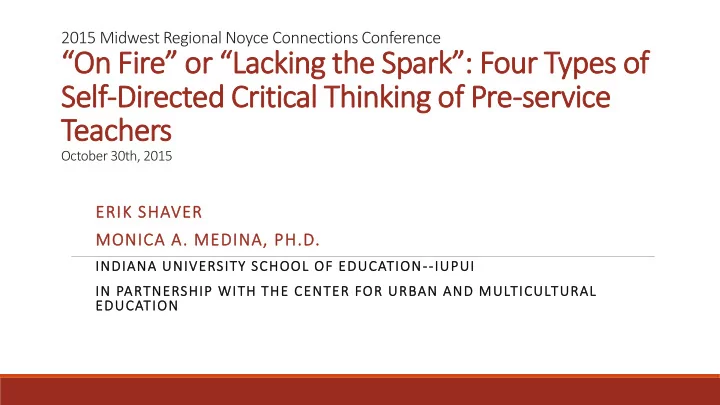

2015 Midwest Regional Noyce Connections Conference “On Fire” or “Lacking the Spark”: Four Types of Self-Directed Critical Thinking of Pre-service Teachers October 30th, 2015 ERIK SHAVER MONICA A. MEDINA, PH.D. INDIANA UNIVERSITY SCHOOL OF EDUCATION-- --IUPUI IN PARTNERSHIP WITH THE CENTER FOR URBAN AND MULTICULTURAL EDUCATION
Workshop Overview Interactive urban school discussion Presentation of our teacher education program Presentation of Research Four Types of Self-Directed Critical Thinking Discussion Questions and Answers IU SCHOOL OF EDUCATION - CENTER FOR URBAN AND MULTICULTURAL EDUCATION
Define what is an urban school? SMALL GROUP DISCUSSION LIST THE CHARACTERISTICS OF AN URBAN SCHOOL IU SCHOOL OF EDUCATION - CENTER FOR URBAN AND MULTICULTURAL EDUCATION
IUPUI Secondary Education Program Brief Overview IU SCHOOL OF EDUCATION - CENTER FOR URBAN AND MULTICULTURAL EDUCATION
Diversity and Learning Course 16 WEEK COURSE 12 WEEK EARLY FIELD EXPERIENCE IU SCHOOL OF EDUCATION - CENTER FOR URBAN AND MULTICULTURAL EDUCATION
Course Philosophical Foundations Equity Noyce Scholars Pedagogy Integrated into IUPUI Pre-Service Ed Classes IU SCHOOL OF EDUCATION - CENTER FOR URBAN AND MULTICULTURAL EDUCATION
Multicultural How does culture Autobiographical impact student Reflection Paper Competence learning? What cultures do Multicultural my students Student Cultural bring to the Interview Competence classroom? How do I teach Equity students who are Critical Reflective culturally Paper Pedagogy different? How do I critically Critical Asset-based examine urban Community Social Justice schools and Assessment communities? IU SCHOOL OF EDUCATION - CENTER FOR URBAN AND MULTICULTURAL EDUCATION
Qualitative Research Study: Pre-service Teacher Critical Thinking Discussion of traditionally taboo social topics to debunk stereotypical views of non- dominant American “Others” Critical Journaling (Miller, 2005) to examine pre-conceptions and construction of “selves” and education (Schön, 1987) Development of critical thinking CRITICAL for teacher education programs (Adler, 2008; Posner, 1989; Zeichner, 1999). Critical thinking is the “ability to engage with multiple layers of complexity” (Sensory & DiAngelo, 2012, p. 12). IU SCHOOL OF EDUCATION - CENTER FOR URBAN AND MULTICULTURAL EDUCATION
Methods Interpretation of a phenomenon in which participants make meaning of the world (Merriam, 2009). Utilization of multiple data points to triangulate findings (Creswell, 2013; Lincoln & Guba, 1985). Searched critical journals and writings for statements & language regarding how pre- service teachers interpreted their own transformation as they experienced their field work. Creation of coding tree after all researchers reviewed data to establish pre-set categories (Charmaz, 2006; Powell & Renner, 2003). Students were not given a prompt; were asked to reflect on field experiences (Bain et al., 1999). Journals coded as “deep,” “shallow,” or “absent” of critical thought/reflection. IU SCHOOL OF EDUCATION - CENTER FOR URBAN AND MULTICULTURAL EDUCATION
Four Types of Critical Thinking Critically Oriented and Engaged: “On Fire” Showed pre-conceived notion of how society functions, privileging some/oppressing others (Apple, 2004; Feagin, 2010). Growing Critically Throughout the Semester: “Heating Up” Shift over time, initial resistance gave way to reflection. Starting Critical but Not Staying Critical: “Smoke” Early interaction/critical thinking that disappears over time. Class structure issue? No Critical Thought: “Lacking the Spark” No critical thought at any time IU SCHOOL OF EDUCATION - CENTER FOR URBAN AND MULTICULTURAL EDUCATION
Potential Impact Address matters regarding teacher education programs that promote deficit thinking & cultural mismatches (Howard, 2010; Marx, 2006; Nieto 2000, 2004; Polack, 2012) Holds pre-service teachers and teacher educators accountable for their reflective practices (Gay & Kirkland, 2003). Forces pre-service teachers to deconstruct societal norms, albeit sometimes uncomfortably (hooks, 1994). IU SCHOOL OF EDUCATION - CENTER FOR URBAN AND MULTICULTURAL EDUCATION
Discussion & Q&A IU SCHOOL OF EDUCATION - CENTER FOR URBAN AND MULTICULTURAL EDUCATION
Recommend
More recommend